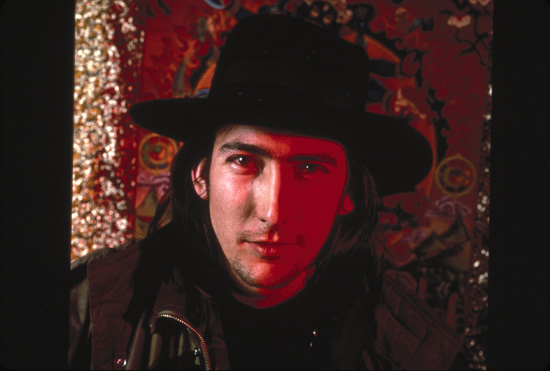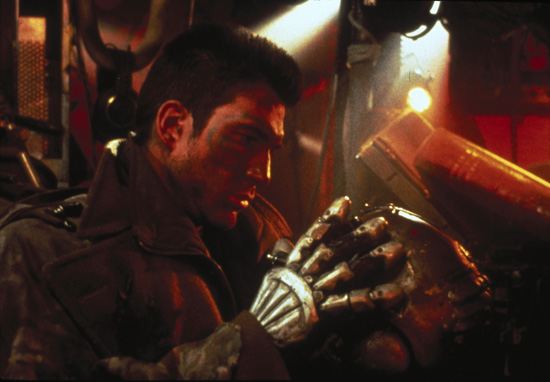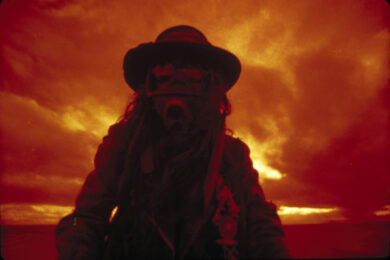Our governments have global warming, swine flu, nuclear proliferation and overpopulation to contend with, but instead of trying to stop their citizens from tuning into American Idol and posting idiocies best left unshared on Twitter, the powers that be are busying themselves developing robotic drone soldiers that can kill you with microwave weapons (we know, anyone who reads Nuts deserves it). After all, it’s going to be way too hot for human soldiers to trudge across third world deserts killing children in 20 years isn’t it?
Sure, this might sound a little paranoid, but there’s a hell of a lot of truth in it. And if you want to indulge your imagination in a vision of what the future might just hold, then the debut release of the 90s cult classic Hardware on DVD comes just in time.
Featuring a killing machine called M.A.R.K 13, which has been designed to keep the population of a dystopian nuclear wasteland in check; whacked television programmes that feature Gwar playing on repeat; a brand of hallucinogenic cigarettes called Major Good Vibes; a radio show hosted by a psychopath called Angry Bob (Iggy Pop); peeping Toms with radiation sickness; and film-stealing cameos from Fields Of The Nephlim frontman Carl McCoy and Lemmy, it’s a film unlike any other.
Directed by Richard Stanley, it’s one of the few movies to genuinely maintain the whacked edge that was, at the time, only found in comics such as Crisis, Cobalt 60 and 2000AD. Over a heroic amount of strong black coffee, The Quietus cornered the eccentric director to talk nuclear annihilation, Psychic TV, Nazis, Goethe and the end of the world as we know it . . .
People often talk about Hardware as being the first 2000AD spin-off. How inspired were you by the legendary comic?
People talk about the 2000AD link too much, because both the creators of 2000AD and myself were really coming from the generation before. I think one of the biggest influences on me was actually Soylent Green, an early utopian sci-fi movie starring Charlton Heston — it’s not very good, but it’s the first place I heard the phrase ‘Greenhouse Effect’. I saw it when I was about 12 and the ideas in there about global warming and the death of everything in the oceans hit me hard. I then read the book it was based on, Harry Harrison’s Make Room! Make Room!, which would definitely have been a big influence on 2000AD. However, the greatest influence that you can see spanning Judge Dredd and my work would be Roger Zelazny’s Damnation Alley.
How about the works of Phillip K Dick?
Dick is certainly a prophet. The ‘Perky Pat Layouts’ he talked about in The Three Stigmata of Palmer Eldritch are basically an early evocation of virtual reality. The jargon doesn’t even exist yet to describe some of the stuff he was writing about. It’s very powerful, and he obviously went through a lot of what he describes in books like VALIS.
Perhaps the most striking achievement behind Hardware is how young you were when you made it — you must have been about 20?
Hmmm . . . well, I was actually in pretty murky psychological shape at the time; I had been fished out of the war in Afghanistan and put straight into pre-production.

You were a soldier?
I had gone and joined a guerrilla Muslim faction in Afghanistan, but luckily they came out there, found me and got me out of trouble. Then they brought me back and signed me over the rights to the movie, which went straight into pre-production. They were strange experiences to have back to back, but I guess a lot of that spills over into the movie and the way it looks.
It has a really dark aesthetic — all the background stuff on the TV and radio is really out there.
When the world goes bad you can bet that the television is going to be worse, so all of the music and TV in the background was really exaggerated – we kind of went after an equivalent of Psychic TV.
You have covered some very dark topics in your career, making documentaries like The Secret Glory about the Nazi Otto Rahn and his search for the Holy Grail. Did those interests inform the aesthetic of Hardware?
It’s something I probably wasn’t aware of at the time, but it certainly seems to have bled through. It’s even more explicit in my later film, Dust Devil with the character spouting what sounds like Cathar dogma (the Cathars were a medieval Christian religious sect who believed that the material world was intrinsically evil; they were thought by Rahn to have been the keepers of the Holy Grail), but it wasn’t until I came to make The Secret Glory that I actually found a framework for those interests. Maybe it was there in the unconscious — you’re always striving towards something, even if you don’t know what it is you are striving towards. The droid in Hardware is a good example of that. In a sense, the droid is on a spiritual quest; he is striving towards the light at all times.
How do you mean?
In Goethe’s Faust they say he that strives towards the light is saved, whether or not he knows that’s what he’s doing. The droid simply seeks out 35°C heat blips. It doesn’t know it is committing evil; it’s simply fulfilling its primary program to reach for the light at all times. It has a brain, so presumably it gets some kind of endorphin rush when it fulfils that purpose.

Do you see a parallel between Hardware and the current development of super soldier exoskeletons in the USA?
It’s worse than that I’m afraid. The Talent Programme are actually building drone soldiers, and they hope to have replaced 50 per cent of the US fighting force with them by the year 2020. With drone aircraft being such a success, drone soldiers are considered to be the way to go, and their website says these drones will eventually go from being remote controlled to being fully battlefield responsive, which means they could make up their own minds about what to fire upon. It’s absolutely terrifying.
Does Hardware feel prophetic then?
I hope not. I got a very funny feeling when I looked at the Talent Programme’s website for the first time. I was looking at a droid they are trying to sell called BIG DOG; it’s very agile and they are talking about giving it spider-like crab legs — which I think we’ll eventually see on Mars — so, obviously, it will be able to climb over rough terrain. They’re also developing a droid called DANTE that can climb down volcanic vents. When I was watching this stuff, I found that the hairs on my arms were standing up; it actually scared me and gave me that clammy sensation you get with maggots and spiders and such. Humanoid droids like The Terminator and so on don’t really push my buttons in the same way as a sort of mass of pistons and circuit boards whirring away . . . I am sacred of that shit.
There is something peculiarly nasty about a killing machine that actually looks like a machine.
There is some part of me that thinks in 20 years time we’ll really have to watch out for this stuff; it just feels like an accident waiting to happen. The Talent Programme have the catchphrase ‘We’re Making Movies a Reality’ which is actually pretty funny, because if you’ve ever seen any movies about soldiers of tomorrow, then invariably the soldier malfunctions and goes bad.
Do you think there is a sense in our culture of a self-fulfilling prophecy — an enduring fascination with apocalypse?
There’s certainly something going on, even the fact that I’m working again means there’s something in the zeitgeist. In the 90s nobody wanted to hear a word, there was this feeling that everything was fine, but in the last few years the world’s become very apocalyptic. Notions of apocalypse have been around a long time, though — in the medieval period they were convinced that the end times were coming, and, of course, people have been going on forever about 2012.
Do you buy into that stuff about 2012 being the end date of the Mayan Calendar and therefore the end of the world?
No. Their culture never invented the wheel, and they didn’t even come up with conjunctions like ‘and’ or ‘of’ in their language . . . they certainly never had a Cervantes or Shakespeare. I can’t see how they could create an accurate date for the end of the world. The only thing that could be said for the theory is that they were a solar religion. The sun is basically a big nuclear reaction that goes through different cycles, and it could be that it changes its frequency or something every 2,000 years. All that would need to happen would be a big enough solar storm and enough charged particles flying back through space — after all, a big enough electro-magnetic pulse could change things quite dramatically, taking out every plane and computer in the world.
Hardware: Special Edition is out now on DVD



